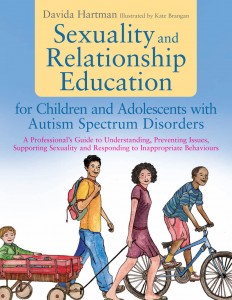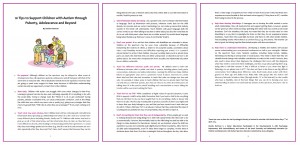 Davida Hartman is the author of the book Sexuality and Relationship Education for Children and Adolescents with Autism Spectrum Disorders has created a list of 10 tips to help parents and other adults feel confident about supporting children with autism through puberty and adolescence.
Davida Hartman is the author of the book Sexuality and Relationship Education for Children and Adolescents with Autism Spectrum Disorders has created a list of 10 tips to help parents and other adults feel confident about supporting children with autism through puberty and adolescence.
- Be prepared. Although children on the spectrum may be delayed in other areas of development, they will experience puberty, adolescence and all that goes with that at the same time as everyone else. This is absolutely normal and to be expected. However, they are going to need extra support in these areas because of difficulties understanding social rules and less opportunity to learn from other children.
- Start early. Children with autism can struggle with even minor changes in their lives. Learning in general can also be slow and confusing, especially if it is anything to do with the social skills. Trying to change rules like ‘Where it is ok to get undressed’ during puberty, already a turbulent time, can cause unnecessary confusion. Look at the things the child does now which may seem cute or quirky (e.g. giving every stranger that they meet a hug) and think “Will it be ok when they are a teenager?” If not, start working on it now.
- Teach what may seem obvious. Most children learn (often confusing and contradictory) information about growing up, relationships and what it is to be a man or a woman from many different places including friends, family and TV. Children with autism tend not to pick up on all of this information, and the information they do take on they find even more difficult to decode, often leading to embarrassing and hurtful experiences. To avoid this, they need things spelled out for them (e.g. that it is not ok to ask someone out on a date repeatedly after they have said ‘No’). Also, don’t assume that because they can do things like list the rules of internet safety that they will be able to use this information in real life. Real life practice is vital.
- Give information clearly and calmly. Use a positive tone. Don’t overload with information or language. Back up information with pictures, whatever works best for the child already. Be concrete and use correct terminology (i.e. not made up names that nobody outside of the family will understand). Teach children with good language skills the correct words to use when talking to teachers or other adults, but also the words that are ok to use with their peers when there are no adults around. Be careful about language being taken literally (e.g. that boys’ voices do not literally ‘break’).
- Don’t over protect. It is a sad fact that children with disabilities are vulnerable to abuse. Children on the spectrum may be even more vulnerable because of difficulties interpreting the motives of others, a desire to be accepted socially, uncertainty about what a real friendship involves and difficulties reporting past events. It is a parent’s natural instinct to protect their children. However, avoiding topics such as private body parts can teach the child that they are either unimportant or shameful and not to be spoken about. Be aware that overprotection from sexuality and relationship education leaves children vulnerable.
- Teach the difference between public and private. All children need to learn the difference between what is public and what is private, including places, body parts, conversations, behaviours and online information. Learning this difference helps children behave in appropriate ways and is a protective factor in abuse. However, be careful about hard and fast rules and remember to teach that rules can change over time and why. For example, it makes sense to teach children that sex is a private topic that they can only discuss with their parents, but what are they to do when all of their peers are talking about it in the yard in school? Avoiding such conversations or worse telling the teacher will be even more isolating for them.
- Teach how to say ‘NO’. While compliance is highly valued in special education, it does little to support a child’s safety skills. Remember that if you teach a child to do everything that you tell them to do, you have taught them to do everything a bully or abuser tells them to do also. The first step to being able to protect yourself is to know your rights and to know that your body belongs to you, and that you have control over it and what you do with it. When a child says ‘No’ to an abuser, it shows that they understand the rules of touching and sexual behaviour and, very importantly, they are able to report it.
- Don’t do anything for them that they can do independently. Often, people get so used to making decisions and doing things for a child with special needs that they start to do so automatically. However, this inevitably leads to the child being less and less able to do things or make decisions for themselves. Instead, set up situations where the child can experience success and constantly push slightly beyond these boundaries. Allow them to do daily tasks independently, even if it takes them longer to complete. Involve them in decisions about their lives. Give them meaningful choices throughout the day. Also allow them a wide range of experiences from which to learn from (even if they find these new experiences uncomfortable at first and need extra support). If they have an IEP, consider them being involved in the process.
- Help them develop friendships. If teenagers are to develop the skills needed to enter adult relationships, they will need practice and support getting there. However, people on the spectrum often need and enjoy spending time alone and may actively avoid social situations. Don’t be mistaken, this does not mean that they do not also need or want friendship in a way that is meaningful for them or that they do not experience intense loneliness. Teach them the social skills involved. Link them in with other similar children. Find socialising events where there is a common focus, e.g. the cinema. The internet can also be great for linking together likeminded people with obscure interests.
- Help them to understand themselves. Developing a healthy and realistic self-concept means understanding your own personal weaknesses as well as your strengths. Children on the spectrum have many fantastic qualities, including being honest, reliable and having a strong sense of social justice. They need to learn that they are valuable human beings with valuable contributions to make to this world. However, they also need to learn about their diagnosis, the challenges that come with this diagnosis, what they need to overcome these challenges, and how to go about getting them (e.g. being able to tell their teacher “I find it difficult to listen to you when that light is flickering, can we please turn it off?”. This does not have to be done in one big difficult conversation. Start talking about difference early. Read books about autism with them geared for their age and ability level. Make links with groups like the Autism Self Advocacy Network. Introduce them (through books, TV or the internet) to role models who have a disability. One of the best things that you can do to develop your own understanding of autism is to read books by authors on the spectrum, they have a lot to teach us.
 Download a handout for family, friends and teachers here.
Download a handout for family, friends and teachers here.
Davida Hartman is the author of Sexuality and Relationship Education for Children and Adolescents with Autism Spectrum Disorders published by Jessica Kingsley Publishers.
Excellent information.
This is all fine and good but what about kids like my son that have major issues with communication. Suggesting honest conversations doesn’t help in these instances.
Help them learn. Focus on one thing at a time.
Thank you so much.
Such a wonderful article. I just finished reading this with my autistic teen and it was very helpful. Thank you.